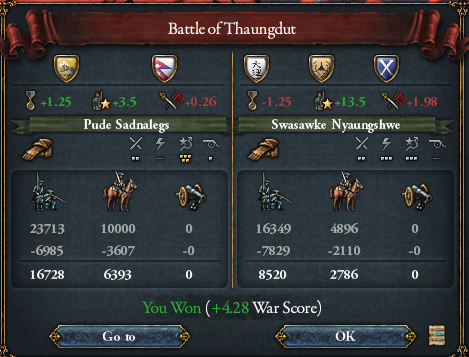|
habeasdorkus posted:I'll put my vote towards whoever agrees to back the building of Lasya's pyramid. We will see more of the pyramid
|
|
|
|

|
| # ? May 31, 2024 05:31 |
|
Innovative
|
|
|
|
Let's Innovate!
|
|
|
|
Quality Out of curiosity, is there any real space for colonists with this mod? It seems like most of the traditional colonizing space of an EU game, i.e. the Americas, has gotten filled up with more advanced states and less open space.
|
|
|
|
I want to vote administrative, but none have voted for it yet, so... Innovative. Second best.
|
|
|
|
PurpleXVI posted:Quality Yes, europe. Innovative.
|
|
|
|
Innovative— the pace at which the world moves is accelerating, and we must take steps to keep pace with it.
|
|
|
|
Aristocratic Let's show these other states why we hold the crown! (Or whatever Tibetans use to signify authority!)
|
|
|
|
Empress Theonora posted:Innovative— the pace at which the world moves is accelerating, and we must take steps to keep pace with it. Indeed, we must leave behind the superstitions of the past, while building on the shoulders of giants, like Empress Lasya!
|
|
|
|
I think we can get to my real first choice (humanist) later. For now let Tibet be Innovative We need to make sure we can adapt to whatever is coming for us.
|
|
|
|
Innovative
|
|
|
|
Innovative
|
|
|
|
Aristocratic
|
|
|
|
Innovative!
|
|
|
|
It is sometimes said that less is more, but for the great Tibet, the land of plenty, more is more. Quantity
|
|
|
|
Innovative Would have chosen Diplomatic but then I remembered our new Empress has a 0 diplo score.
|
|
|
|
Gravity Cant Apple posted:Would have chosen Diplomatic but then I remembered our new Empress has a 0 diplo score. Diplomatic
|
|
|
|
Quantity.
|
|
|
|
Maritime 
|
|
|
|
Innovative
|
|
|
|
Diplomatic
|
|
|
|
Aristocratic
|
|
|
|
With a total of 34 votes: Innovative (16): TheFlyingLlama, Mirdini, Technowolf, Crazycryodude, do NOT jack off, Jossar, Pacho, Lynneth, NewMars, Empress Theonora, Josef bugman, ThatBasqueGuy, Sanzh, Ferrovanadium, Gravity Can't Apple, Aeromancia Aristocratic (6): Lord Cyrahzax, Ihrendur, megane, Chatrapati, Retarded Goatee, welfarestateofmind Diplomatic (4): QuoProQuid, zanni, Snipee, AJ_Impy Quantity (2): Xelkelvos, Yavuz Quality (2): Eleven Eleven, PurpleXVI And tied for 1 each: Economic (Soup du Jour); Expansion (Albino Squirrel); Religious (Coward); Maritime (SirPhoebos). Kangxi fucked around with this message at 16:53 on Apr 18, 2020 |
|
|
|
There's no Paradox LP Modernists can't fix. Innovative
|
|
|
|
Luhood posted:There's no Paradox LP Modernists can't fix. The bad news is the vote's over, the good news is you won
|
|
|
|
Oh! I thought that was a Current Score update rather than Final Score, my bad!
|
|
|
|
Chapter 60: 1462 to 1487 - Elephants and White Parasols Edited selections from Asia: A Struggle for Supremacy by Idirissa Mansaray. Niani University Press, 1919. ======================  The imperial domains of Tibet, by the latter half of the fifteenth century, had begun their transformation into a center of art and literature; as well as a center of study for natural sciences. The court in Lhasa had become a center for the discussion of philosophy and observations about the world, and the Prince-Regent was willing to spend great sums to attract some renowned writer or philosopher.  While it would not be entirely accurate to claim that this was an outgrowth of what we in the modern era might call 'scientific' thought - indeed alchemy and astrological traditions continued apace, the distinct flowering of Tibetan culture continued in several distinct spheres. The visual arts, in particular, were well represented by the famous works of such artists as Dharma Lotsawa Rinpoche, and Tenzin Palden, and the playwright Archana Bandopadhyay. The latter, in particular, while drawing from more archaic texts in classical Tibetan and Sanskrit, also was renowned for her use of more contemporary language. In particular, her rediscovery of some of the earlier works of history such as the Legends of the Purgyals and her unprecedented access to autobiographical texts by religious figures has contributed to a flourishing of literature in this era.  After decades of internal strife, the incomes of the tenant lord and the farmer he employed were hiring,  the marketplaces were prosperous with fine amber, cotton, silk, turquoise, coral, and other such goods,  and trading ships soon plied the routes from the Bengal delta to the straits of Malacca or the Red Sea and beyond.  Yet it would be remiss to assume that all was well at this time. Tensions remained between the authorities of the Sacred Hierarchy and the imperial seat over overlapping authorities and tax farming;  and the prince-regent was notably lax over issues of smuggling, which limited further his ability to levy taxes.  Yet even with these issues in play, he, as many Tibetan rulers in the past, had decided to embark on a campaign of military adventure. Despite having no military experience of any kind or any basic training, he had felt that a successful war would be useful to maintain the pretense of his authority and justify his continued regency. The Tarim Basin was too remote, the Jin Dynasty was too vast and too populous, and a campaign against the southern polities would be unthinkable and force them all to unite against him.  He was not entirely misguided in this case - he avoided the larger Kingdom of Ava for fear of the later Jin's intervention;  and he eschewed a campaign against the states of Arakan, for Tibet was still reliant upon their exports of iron ore.  So by process of elimination, he had declared a war against the Tai and Kachin states of the north.  While at first, the Tibetan armies were able to force a surrender of the entire army of these northern confederations,  They were almost immediately driven back by the experienced and better trained Bamar armies from the south, who had come to their aid.  The regent had sacked the first expeditionary general, appointed another, and then sent him forward to experience the same defeat.  Seeing this arbitrary and incompetent treatment, a group of Tibetan nobles rose in rebellion, challenging the regent's competence and right to rule.  With this, the Tibetans were said to have faced two wars simultaneously.  The Tibetans would have been doomed if it were not for the armies of their own allies - in particular, those of the vassal Kingdom of Nepal, who were disciplined and outstanding in martial valor.  The war would soon turn in Tibet's favor, but not without the expense of the prince regent and the young empress herself, who was viewed as a hapless puppet of a shambling and capricious group of advisors.  The Tibetan invasion was concluded by 1468. The Tibetans would retain the Kachin Hills and much of the Chindwin River valley but at massive expense of both troops and coin.  Much of the regent's time and effort, when it was not spent lavishing gifts on his artistic clients, was devoted to ruling those territories that he had seized in the east.  At this time, the Timurids in the east, under the reign of the much more able Timur III, had effectively controlled the Sacred Hierarchy through a series of diplomatic maneuvers and personal promises,  The Kingdom of Ethiopia had maintained its impassive hold over the Red Sea and the Gulf of Aden,  And the Taira clan had begun its ascendancy over the whole of Japan, its victory all but assured after dealing a decisive blow to radical Buddhists.  Tibet was not entirely lost in its own internal issues; traders continued to sail south along the coasts and would make their way to the city of Mogadishu, not long after its capture by the Ethiopians, and the cities of the Kilwa Sultanate.  Also left to their own devices, the former constituent parts of the Tibetan Empire engaged in their own 'small wars' over trading rights, land ownership, and the occasional radical sect.  The authority of the Sacred Hierarchy itself, while far from unimpeachable, began to show signs of strain. Stories of corrupt priests, disrespect of the local pantheons and customs, the sale of offices, and the hoarding of wealth in monastic holdings widely circulated among all the peoples south of the Ganges at this time.  When Queen Ngawang III took power in 1468, her reign was marked by a more serious attempt to address these questions of rulership and good governance.  Her policy was marked both by attempts to curtail the powers of the nobility -- whose powers were still vastly curtailed after their massacre by Empress Lasya in the 1410s - as well as the formation of a more widely distributed bureaucracy, with some loose influences from a Chinese model of appointment, training, and circulation of officials beyond their native provinces.  The queen was said to have had little interest in marriage besides, and the throne was expected to pass to her younger brother, Mangsong Mangtsen.  She at least was more proactive in foreign policy than the prince-regent, and paid more attention to the affairs of - and at times the instability of - her neighbors.  At this time, the development of science and culture continued even well beyond the bounds of the city of Lhasa. Other anatomists, pharmacologists, and astronomers published new works that contradicted previous traditional works based on direct observation of their environments. The empress was said to have intervened in the case of one or two more outspoken authors but maintained a generally permissive atmosphere for her time.  The slow rot of the Tibetan military continued apace - in 1475, an entire garrison force was routed and forced to surrender outside the city of Kalay.  While the rebellion was crushed with outside reinforcements, this only demonstrated the tenuous hold of the empire in the east - and implicitly revealed why previous emperors and empresses did not venture to campaign in such difficult terrain. And while Tibet had almost reached the limits of expansion for the time being --  -- barring the odd inheritance of a sacred site, for example.  More belligerent vassal princes were crushed by a coalition of their neighbors.  Timur III, having perhaps learned from Tibet's example, did not demand direct control over all of his neighbors, but instead enforced a system of vassals and tribute. His empire, following the example of his grandfather Timur, did exercise direct control of the holy cities of Mecca and Medina, and its residents were granted protection, as befitting his grandfather's example.  The Tibetan court read eagerly over books about the kingdom of Ethiopia, and travel narratives which provided some limited though mostly accurate information about the great Maharani Bekele II.  In 1476, when the empress married the young noble Detrun,  she may have been troubled by the news that the Timurids were raiding Central Asia,  or of the resurgence of the Jerusalem Raj.  Which is why she was so nervous as to have dropped the crown and embarrassed herself repeatedly at the wedding ceremony. It was the first glimpse many outside ambassadors had seen of the court in years, and none were impressed at first.  Still, she had turned the court itself into a sanctuary for higher thought, replete with books of all kinds,  and with this surfeit of engineering knowledge, it was no surprise that the great pyramid built by the great and terrible Empress Lasya was finally completed some decades after its construction began in the 1410s.  Even if it was far away from the true centers of knowledge and learning in this world which so preoccupy our imaginations when we think about the 1400s, far away from our own great empire's voyages of discovery west, one must recognize that the empress had shepherded a not inconsiderable collection of intellectual ability.  Almost as if she knew her empire's deficiencies, she invested in larger dockyards and the construction of sturdier ships,  and the increased production of artillery pieces.  These were to be deployed against the little states of Arakan, and indeed the new Tibetan navy had outdone itself.  And while Tibet could soon boast of a brilliant victory over a few small city-states,  their Thai allies and co-religionists in Ayutthaya soon came to the rescue.  The Tibetan army was without hope by the time the Thais had arrived,  and the gods of war abandoned them utterly.  The Tibetans were able to eke out a victory by claiming the trade city of Mrauk U. But if each 'victory' proved to be so catastrophic for the Tibetans, they would have lost their entire army five times over by the time they had hoped to advance to Ayutthaya itself.  While Tibet crept slowly to the east,  and hoped to clean up the areas which their own defeats had won them,  the greater powers of the Timurids in the west were rising,  and they would soon face opposition within their own empire. These will be discussed in successive chapters.  Far from a 'trinary' system of Tibet, the Mongolians, and China, the world grew further divided into the spheres of other great powers, each with their own contested territories, ambitions, and ideas.  The networks of trade which had formed in the waves of Mongolian and Tibetan expansion still held,  even as the government of Tibet stretched itself thin.  The empress' own total inability to manage diplomacy and personal coldness did not contribute,  but in the abstract, and when she was away from the crowds of court and town, she still favored legislation and policy which positioned Tibet well to manage these new ebbs and flows of people.  The increased demand for crafts and more complex goods soon spread among the many cities of the subcontinent, from Lhasa to Trincomalee, and this general prosperity soon made itself apparent in the quality and sophistication of goods demanded in urban centers as well as the old holdings of the churches and nobility.  The Empress Ngawang III no doubt would have continued to oversee and manage her domain's new prosperity had she not died suddenly of illness in her fourth decade.  Her brother, now Mangsong Mangtsen II, ascended the throne. The start of his reign was greeted with a kind of optimism, though there were rumors and innuendo among the nobility over his total lack of interest in marriage or producing an heir.  He started off his reign with a burst of activity, calling upon the great Khasag and negotiating with other polities to pool resources, reduce the barriers of the sale of goods between kingdoms, and to reduce construction costs.   After some prodding, he married the noblewoman Trikar Monyul, who soon developed a warm and collegiate relationship with her husband, had a reputation for bluntness which sabotaged the more subtle diplomatic negotiations he hoped to accomplish. In any case, the political situation of his neighbors, and indeed all of Asia, would be overturned.  In the early years of the 1480s, the Purgyal Jin Dynasty would find itself financially stressed, with a desperate and discontent nobility, and facing peasant uprisings in Sichuan and Jiangxi. The feeling of general distrust was compounded by a long and exhaustive war against the Kingdom of Lan Xang, which had dealt the Jin several decisive defeats in the Phou Luang mountain range.  The situation was disastrous, but not wholly lost until the capture of Nanjing and the deaths of much of the Purgyal family in 1486.  With only the last Purgyal Emperor, Ciwei (赐威) in the east remaining, he valiantly contained to lead campaigns against rebels and nobles at the head of his army for another year, and his struggle for these last few months remains an example for the conduct of a military campaign even in the most grievous circumstances.  but soon the rain of problems became a flood.  A contemporary writer based in Chengdu is said to have written on the effects of the war and the destruction of imperial authority: "It was as if Lasya the Evil, having usurped Lord Yama in hell, had been summoned back to our land and swung a mace all over the earth,"  "Leaving naught but ruin as her revenge." Kangxi fucked around with this message at 15:50 on Apr 24, 2020 |
|
|
|

|
|
|
|
"Told you so, losers" - Lasya
|
|
|
|
Kangxi posted:
In honor of their contributions, the Kingdom of Nepal has been presented with a square flag variation. 
|
|
|
|
Are there two different Jins in China now?
|
|
|
|
LJN92 posted:Are there two different Jins in China now? Yes. One is a relocalized Ming tag, the other is the vanilla Jin tag.
|
|
|
|
Can't wait to watch Qi sit on their hands so badly it fucks every single one of their neighbors through pure lassitude and stupidity again.
|
|
|
|
Sucks to be them! Less for us to worry about as we seek ever more inventive ways to beat up Princes.
|
|
|
|
I'm rooting for a Han resurgance. It would just be lovely in so many ways.
|
|
|
|
RabidWeasel posted:I'm rooting for a Han resurgance. It would just be lovely in so many ways. Different Han. The classical Han Dynasty draws its name from the Han River, which is in the middle of the Xi on that map. The Han on the map is quite possibly named for a different Han River that's located in Taiwan. 旱溪, not 漢江/汉江.
|
|
|
|
Nice, a power vacuum to exploit and a pretty good ruler.
|
|
|
|
Tulip posted:Different Han. The classical Han Dynasty draws its name from the Han River, which is in the middle of the Xi on that map.
|
|
|
|
RabidWeasel posted:
Unfortunately the majority of dynasties have lame names. 商 Shang - "Commerce" 周 Zhou - "Thorough" 秦 Qin - an area in modern Shaanxi/Gansu 漢 Han - a tributary of the Yangtze 新 Xin - "New" 魏 Wei - an area in northern China 蜀 Shu - Sichuan 吳 Wu - Jiangsu-ish 晉 Jin - "Promote" (this is deeply funny to me) Things get real fucky here 北魏 Bei Wei - Northern variant of the previous 'Wei' above 西魏 Xi Wei - Western variant of the previous 'Wei' 東魏 Dong Wei - Eastern variant of the previous 'Wei' 北周 Bei Zhou - "Northern Thorough" 北齊 Bei Qi - "Northern Uniform" 劉宋 Liu Song - "Battle-Axe" (surname) an area southeast of the Yellow River [I'll admit this one I can dig] 南齊 Nan Qi - "Southern Uniform" 南梁 Nan Liang - "Southern" an alternate name for 'Wei' as above after they changed their capital 西梁 Xi Liang - "Western" an alternate name for 'Wei' as above after they changed their capital 陳 Chen - "Display" also an area of southeast China OK we're out of the swamp of Northern & Southern 隋 Sui - "Submission" 唐 Tang - an area in northern China Oh no another period of disunity; all of these are usually refered to as "Later [x]" in English because none of them are original, except Liao for funny reasons. 梁 Liang - an alternate name for 'Wei' as above after they changed their capital 唐 Tang - an area in northern China 晉 Jin - "Promote" 漢 Han - a tributary of the Yangtze 周 Zhou - "Thorough" 遼 Liao - "Distant" (lmao) Back on track 宋 Song - an area southeast of the Yellow River 西夏 Xi Xia - "Western Grand" (this threw me off b/c I want it to be "Western Summer" but oh well) 大金 Da Jin - "Great Gold" 大元 Da Yuan - "Great Source" 大明 Da Ming - "Great Morning" 大清 Da Qing - "Great Purity"
|
|
|
|

|
| # ? May 31, 2024 05:31 |
|
Any reason why our armies keep getting mulched?
|
|
|
















 so that means I can be a cheapskate and post about posting instead of having some wit or spending any more on comedy avs for people. Which I'm also incapable of. Comedy.
so that means I can be a cheapskate and post about posting instead of having some wit or spending any more on comedy avs for people. Which I'm also incapable of. Comedy.




















